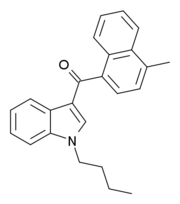JWH-073
 | |
| Legal status | |
|---|---|
| Legal status |
|
| Identifiers | |
| |
| CAS Number |
208987-48-8 |
| PubChem (CID) | 10471670 |
| ChemSpider |
8647081 |
| ECHA InfoCard | 100.230.192 |
| Chemical and physical data | |
| Formula | C23H21NO |
| Molar mass | 327.42 g/mol |
| 3D model (Jmol) | Interactive image |
| |
| |
| | |
JWH-073, a synthetic cannabinoid, is an analgesic chemical from the naphthoylindole family that acts as a partial agonist at both the CB1 and CB2 cannabinoid receptors. It is somewhat selective for the CB1 subtype, with affinity at this subtype approximately 5x the affinity at CB2.[2] The abbreviation JWH stands for John W. Huffman, one of the inventors of the compound.
On 20 April 2009, JWH-073 was claimed by researchers at the University of Freiburg to have been found in a "fertiliser" product called "Forest Humus", along with another synthetic cannabinoid (C8)-CP 47,497.[3] These claims were confirmed in July 2009 when tests of Spice product, seized after the legal ban on JWH-018 had gone into effect in Germany, were shown to contain the unregulated compound JWH-073 instead.[4]
Pharmacology
JWH-073 has been shown to produce behavioral effects very similar to THC in animals.[5]
Its effects are produced by binding and acting as an agonist to the CB1 and CB2 cannabinoid receptors. The CB1 receptor is found in the brain. JWH-073 bind to CB1 with a higher affinity than THC, suggesting that taking more too soon after the initial dose could lead to diminished effects. CB2 is found outside the brain, mostly in the immune system. The binding with CB2 receptors has been shown to be similar between JWH-073 and THC.[5]
A search in the literature yielded no published studies of the effects of JWH-073 in humans, but these studies in animals suggest with high probability that JWH-073 produces effects very similar to those of THC in humans.[5]
Derivatives
The 4'-methyl derivative of JWH-073 has been encountered as an ingredient of synthetic cannabis blends in Germany and several other European countries since 2010.[6] The 4'-methoxy derivative JWH-080 is also known to be a potent cannabinoid agonist and has been banned in some countries, though it is unclear if it has also been used in synthetic cannabis smoking blends.

Legal status
United States
The US DEA temporarily declared JWH-073 a schedule I controlled substance on 1 March 2011 through 76 FR 11075, and permanently instated the same schedule on 9 July 2012 in the Section 1152 of the Food and Drug Administration Safety and Innovation Act.[7]
Australia
On 8 July 2011 the AUS government banned the sale of JWH-073.[8] JWH-073 is considered a Schedule 9 prohibited substance in Australia under the Poisons Standard (October 2015).[9] A Schedule 9 substance is a substance which may be abused or misused, the manufacture, possession, sale or use of which should be prohibited by law except when required for medical or scientific research, or for analytical, teaching or training purposes with approval of Commonwealth and/or State or Territory Health Authorities.[9]
New Zealand
On 8 May 2014 the New Zealand government banned the sale of JWH-073. [10]
Turkey
On 7 January 2011 the Turkey government banned the sale of JWH-073. [11]
See also
References
- ↑ http://www.likumi.lv/doc.php?id=201101&from=off
- ↑ Aung MM, et al. (August 2000). "Influence of the N-1 alkyl chain length of cannabimimetic indoles upon CB(1) and CB(2) receptor binding". Drug Alcohol Depend. 60 (2): 133–40. doi:10.1016/S0376-8716(99)00152-0. PMID 10940540.
- ↑ Forest Humus - Enthält synthetische Cannabinoide (in German)
- ↑ Lindigkeit R, et al. (July 2009). "Spice: A never ending story?". Forensic Science International. 191 (1–3): 58–63. doi:10.1016/j.forsciint.2009.06.008. PMID 19589652.
- 1 2 3 https://web.archive.org/web/20100803203526/http://www.deadiversion.usdoj.gov/drugs_concern/spice/spice_jwh073.html. Archived from the original on August 3, 2010. Retrieved August 5, 2010. Missing or empty
|title=(help) - ↑ EMCDDA Annual Report 2010
- ↑ "Schedules of Controlled Substances: Temporary Placement of Four Synthetic Cannabinoids Into Schedule I". DEA Office of Diversion Control. Retrieved 11 March 2014.
- ↑ (PDF) https://web.archive.org/web/20120604101005/http://www.tga.gov.au/pdf/scheduling/scheduling-decisions-1107-final.pdf. Archived from the original (PDF) on June 4, 2012. Retrieved August 2, 2011. Missing or empty
|title=(help) - 1 2 Poisons Standard October 2015 https://www.comlaw.gov.au/Details/F2015L01534
- ↑ Synthetic cannabis › What they are
- ↑ › Turkish Drug Law